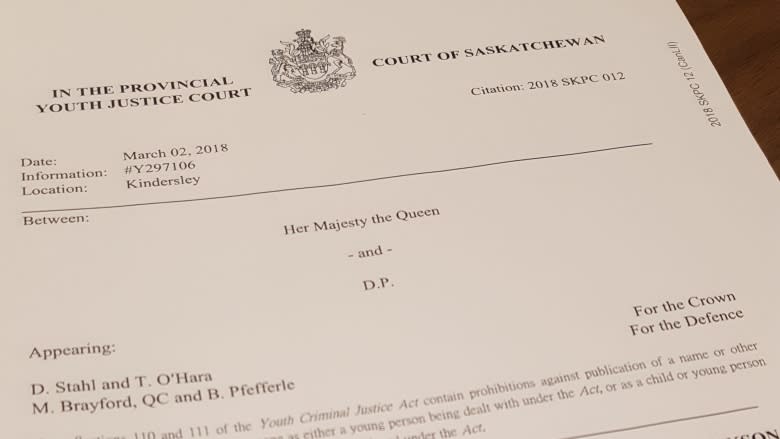Judge says Mountie 'skewed' information to get blood evidence in alleged drunk driving crash
A judge has harsh words for an RCMP officer's work on a November 2015 crash near Kindersley, Sask., that killed one person and injured three others.
Judge Robert Jackson is banning blood evidence from an upcoming impaired driving trial, citing a Charter of Rights breach of the accused.
The blood came from a then-17-year-old whose truck had been coming off a township road when it collided with a vehicle carrying three men. A 39-year-old died in the collision and the teen was later charged.
In a written decision, Jackson says investigating officer Const. Suzanne Doucette fell short of her duty to provide full disclosure when getting warrants for the youth's blood, which had been collected in hospital after he was airlifted to Saskatoon.
"Preparation of the ITOs [information to obtain a warrant] was tailored for only one result," Jackson wrote.
"It is obvious that Constable Doucette drafted the ITOs with a callous disregard for accuracy and fairness, focusing solely on obtaining the warrant and production orders creating a scenario skewed to this purpose."
'Deliberate misstatements': judge
The information Doucette left out when getting the warrant from a justice of the peace includes the fact that the youth had a head injury that could have affected his memory when he said he couldn't remember how much he had to drink, Jackson wrote.
He also wrote that Doucette failed to say there were no signs at the intersection where the crash occurred; that the smell of liquor in the youth's truck after the crash was caused by a ruptured can of beer; and that the faint smell of alcohol on his breath could be insulin due to being diabetic.
Jackson said Doucette made "deliberate misstatements" when she said there was no obstacle obstructing the view from the township road, which included deliberately falsifying her higher-up's conclusion that oilfield platforms were between the two roads.
"The seriousness of the charges before the Court cannot be overstated. The tragic circumstances culminating in the death of an innocent driver and bodily harm to his passengers and the continued prevalence of drinking and driving in our province favours inclusion of the evidence," Jackson wrote.
"As much as one may wish a criminal charge to be heard, it cannot be at the expense of the administration of justice falling into disrepute."
Despite this ruling, "the trial will proceed as scheduled" at the end of May, said Krista Zerr with the regional Crown prosecution office in an emailed statement to CBC.
The RCMP has not yet responded to a request for information on Doucette's current status.



